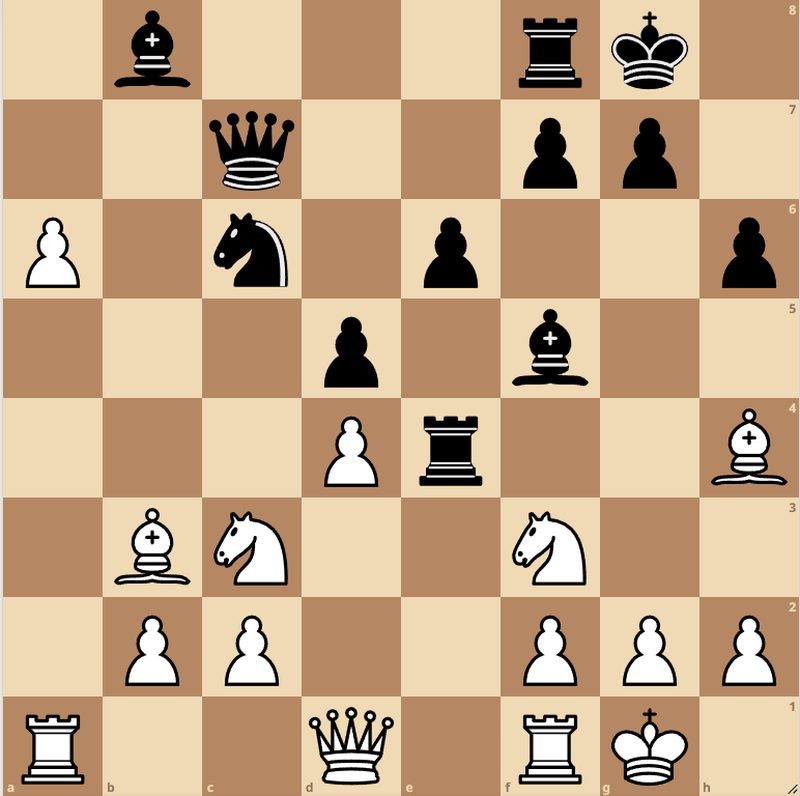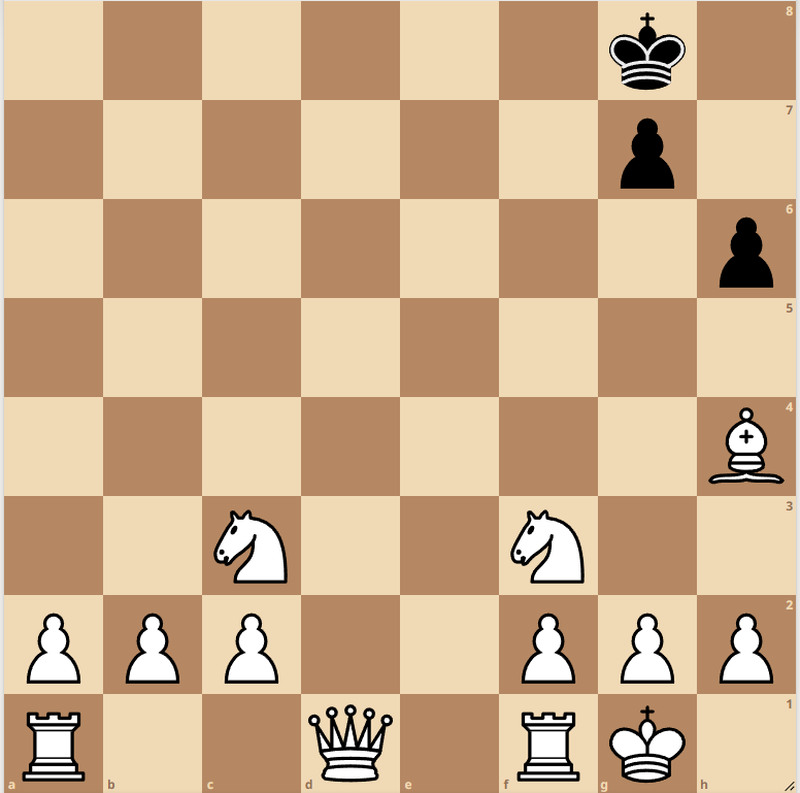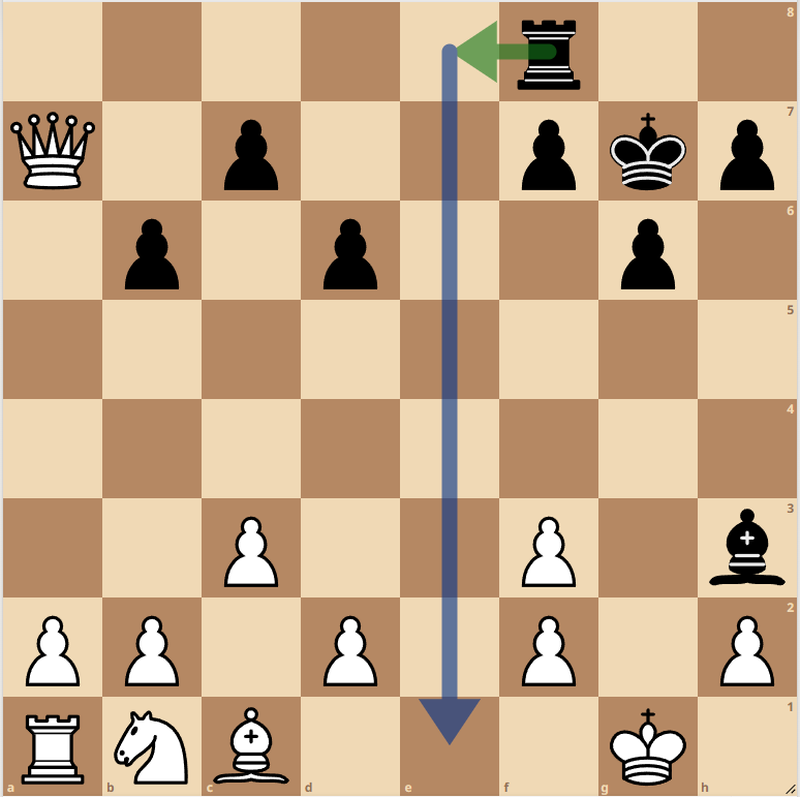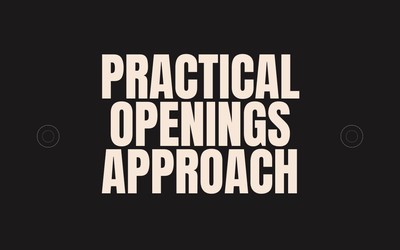
Ryan Velez
Resigning Strategy
This article is for anyone who wants to understand the strategy of resigning, at both low and high levels of chess.Resigning Strategy...?
Strategy can be applied to any decision, and the decision to resign is no exception. In the Win-Loss Spectrum article, I stated “Losers interest me. Everyone likes winners, talks about winners, and celebrates winners. I am more interested in the process of losing.” Resigning is part of that discussion and, in my opinion, the mainstream advice, summarized by the 4 following quotes, falls short on providing people helpful guidance on when to resign:
- “Never resign.” ~ Every chess coach, at some point
- “Quitters never win.” ~ Quick wisdom from coaches and kids
- “Try for stalemate, instead of resigning.” ~ The unexpectedly stalemated crowd
- “No one ever won a game by resigning.” ~ GM Savielly Tartakower
The above four quotes suggest resigning is a terrible idea. Yet, professionals resign all the time. So, what is the thought process behind resigning, and at what moment should someone resign? How do we identify the moment you should resign? There is a lot to consider, more than you might realize, when determining your attitude toward resigning a game.
3 Attitudes of Resigning
There are 3 adoptable attitudes toward resigning:
Always Resign
Many people quit as soon as the tide turns, and they are usually lower ranked players who always link material gain with winning, and material loss with losing. There is no real benefit to adopting this attitude, but it does exist, and people do it.
Sometimes Resign
This is the correct attitude to adopt, once you become an experienced player.
Never Resign
A lot of coaches recommend this advice, especially to newer players (usually kids). While it is true you can hold out for a remote stalemate possibility, or perhaps your opponent may make a weird error and you can win on a technicality, I think it isn’t generally worth it to adopt this as a permanent disposition.
Basic Endgames vs. “Never Resign”
I recommend adopting the “Never Resign” attitude if either, or both, of the following items are true about you:
- You lose most of your games because you keep hanging pieces in 1 turn.
- You do not know the following endgames:
- Q+Q Checkmate
- Q+R Checkmate
- R+R Checkmate
- K+Q Checkmate
- K+R Checkmate
- K+B+B Checkmate
- K+Q vs K+N Checkmate
- K+Q vs K+B Checkmate
- K+1 pawn vs K (Draw)
- K+1 pawn vs K (Win)
When you stop regularly losing by hanging pieces, and you know these endgames, shift your attitude towards Sometimes Resign, and begin considering the correct conditions for resigning. Before moving on to conditions for resigning, let’s breakdown the very common “Never Resign” school of thought.
Problems with ‘Never Resign’
Here is a list of problems that will arise if you indefinitely adopt the “Never Resign” attitude:
Mental Problems
- Delaying the acceptance of a loss prolongs mental stress and anxiety.
- Refusal to resign can foster spitefulness in yourself, which affects future performance.
- And spitefulness stays with you long after the game, which compounds anxiety.
- Never resigning can make losses feel more painful.
Reputation Problems
- Forcing experienced players to complete trivial checkmates can damage your reputation.
- Failure to resign in a timely manner can be considered bad sportsmanship.
- People may opt to waste your time and energy because you did this to them at one point.
Energy Problems
- Personal time and energy are both wasted.
- You waste your opponent’s time and energy.
- If you are the last game, you waste the tournament organizer’s time and energy.
One idea that tags along with “Never Resign” is that all players have a right to keep playing. This is true, but exercising your right to play on does not shield you from the social consequences of refusing to resign in a timely manner.
When should you Resign?
When deciding whether to resign, evaluate the conditions both on and off the board:
On Board Condition Examples
- Upcoming checkmate.
- Material Loss.
- Availability of counter play, or the chances to create it.
- Available cheapos, pitfalls, swindles, tactics, traps, tricks, and zaps.
Off Board Condition Examples
- Playing strength of each player.
- Amount of time left on the clock for both players.
- Tie Breaks.
Additionally, each condition can present as a low-end or high-end version of itself on a sort of ‘Hopelessness Spectrum’:
Hopelessness Spectrum:
- Upcoming Checkmate ranges from Possible to Unavoidable.
- Material Loss ranges from being down 1 point to being down 39 points.
- Available Counter Play ranges from limited counter play to abundant counter play.
- Available Traps and Tactics ranges from low position complexity to high complexity.
- Playing Strength ranges from close in strength to very far apart in strength.
- Clock Time ranges from high amounts of time to low amounts of time.
Low end conditions are not usually enough to merit resignation on their own, but multiple low-end conditions can combine to create a hopeless situation. High end conditions often urge resignation on their own (like unavoidable checkmate), and certainly multiple high end conditions would compound.
Be aware this spectrum is an incomplete example, and that the point is when you consider conditions for resigning, understand those conditions can have a low or high impact on the game. For example, losing your queen usually has a high impact on the game, but sometimes it can have a low impact, too.
Two Practical Examples
Position 1

Position 1 - On Board Conditions
White is winning in position 1 for 2 reasons:
- White has an extra knight and 2 pawns
- White has a passed a6-pawn
If the a6-pawn is put back on a2, the position becomes even, despite the material imbalance. However, the a6-pawn cannot immediately be advanced, either. Therefore, while white is winning, it is going to take some skill to win this game.
From black’s perspective, Position 1 has
- Small Hope Increase: Possible checkmate scenarios.
- Moderate Hope Increase: Black is down 5 points of material.
- Large Hope Increase: An abundance of counter play.
- Moderate Hope Increase: Moderate Complexity
If we ignore off board conditions, black has plenty of reasons to play on. I will note Black has 1...Rxh4 because 2.Nxh4 Qxh2#, which is why the material difference is only a moderate hope decrease and not a large hope decrease. However, the lines for white to win are moderately complex, and if white isn’t careful, black can regain material.
Position 1 - Possible Off Board Conditions
The off board conditions can be manipulated a bit to understand different scenarios from black’s perspective:
Possible Rating Differences:
- Large Hope Increase: White is rated 1000 and black is rated 2600
- Large Hope Increase: White is rated 1000 and black is rated 1100
- Small Hope Increase: White is rated 2400 and black is rated 2600
Possible Time Differences:
- Large Hope Increase: 30 seconds vs 28 seconds
- Large Hope Increase: 5 minutes vs 15 minutes
- Moderate Hope Decrease: 10 minutes vs 8 minutes
- Large Hope Decrease: 10 minutes vs 1 minute
- Extremely Large Hope Decrease: 25 minutes vs 10 seconds
Position 1 Conclusion
When taking into consideration both the "on board conditions" and "off board conditions," the question “When should I resign?” can have different answers. For example:
Scenario 1
- On board conditions - Do not resign
- Rating Strength: 2400 vs 2600 - Resign
- Time: 32 minutes vs 1 minute - Resign
A GM may or may not resign in this scenario; however, the 2400 has the advantage because the time is so low for black. A GM may play on anyway, just because the position is so dynamic. But a non-GM with the black pieces might not be faulted for resigning due to having such low time.
Scenario 2
- On board conditions - Do not resign
- Rating Strength: 1000 vs 2600 - Do not resign
- Time: 10 minutes vs 1 minute - Resign
In this scenario, the GM would not resign. The rating discrepancy is too big, even though the GM only has 1 minute, the GM will be better able to sort through the moderately complex lines of play. The GM will also have more productive thoughts if the opponent takes their time to think through the lines, too.
Scenario 3
- On board conditions - Do not resign
- Rating Strength: 2400 vs 2600 - Resign
- Time: 30 seconds vs 28 seconds - Do not resign
In this final scenario, because the time is low for both players, there is no need to resign. This is especially true if there is an increment or delay, which hints at the idea that increment and delay can influence whether you should resign or play on.
Position 2

Position 2 - On Board Conditions
White is winning in position 2 for 1 reason:
- White has an overwhelming material advantage (34 to 2).
Black has absolutely no hope to win this game. The only thing that might occur is white accidentally stalemates black. So, should black play on and risk being rude or resign? Most of the time, black should resign this position, but let’s check some different scenarios:
Position 2 - Possible Off Board Conditions
Scenario 1
- On board conditions - Resign
- Rating Strength: 1000 vs 2600 - Do Not Resign
- Time: 32 minutes vs 1 minute - Resign
White is winning and has tons of time, but is seriously outmatched. But the position is so hopeless most people would resign. The grandmaster might not resign in hopes of a stalemate, because the chances that a 1000 rated player stalemates someone is much higher than if a 2400 were controlling the white pieces.
Scenario 2
- On board conditions - Resign
- Rating Strength: 2400 vs 2600 - Resign
- Time: 12 minutes vs 9 minutes - Resign
These possible off board conditions suggest 2 things: (1) black should immediately resign, and (2) why did black not resign a long time ago? It would be reasonable to suggest black is being extremely rude in this scenario because the player with the white pieces is clearly capable, and not under time pressure.
Scenario 3
- On board conditions - Resign
- Rating Strength: 1000 vs 2600 - Do Not Resign
- Time: 10 seconds vs 20 minutes - Do Not Resign
If FIDE rules are being applied, black should not resign because black could theoretically promote both pawns, and score a checkmate, which means black will win if white runs out of time. Yet, for example, in US Chess, this position can be declared a draw if white makes the right claim. In other words, the federation rules being used can determine whether someone resigns or not.
Position 2 Conclusion
While such a position is somewhat silly to discuss, it is interesting to see how the off board conditions can alter whether one should resign. If you have read this far, you will also understand there are many more off board conditions than I can probably list. But ...
- the federation rules being followed
- increment
- delay
- how close you are to the next time control
- whether or not a repetition can be forced at will
- whether or not a piece can be sacrificed for the final pawn to cause a draw
... are all examples of other conditions that could be important. The most commonly important conditions will always be the position itself, remaining time, and the strength of each player. Everything else is important, and can be weighed according to the situation.
Meta-Reasons People Resign
While on board and off board conditions give guidance on whether to resign, there are other reasons to resign, which extend outside of the game. I am calling them Meta-Reasons because I am unsure of a better term:
Common Meta-Reasons People Resign
- Respecting the opponent’s ability.
- To be a good sport.
- Tiredness.
- Sickness.
Competitive Meta-Reasons to Resign
- To save time.
- To save energy.
- Resigning in protest organizers make bad rulings or have bad conditions.
Improvement Meta-Reasons to Resign
- To learn how to accept defeat, a key skill in chess.
- To avoid further frustration.
Meta-Reasons not to Resign
- If you need to see your opponent’s technique, do not resign.
- If you suspect an online opponent is cheating, do not resign: this will give algorithms
more data with which to ban someone. - You are on a chess team, and your team has not yet scored more than 50%.
- A championship title is on the line.
Meta-Reasons for resigning are additional considerations that can help determine if you should resign. The most common meta-reason to resign is to save time and energy, especially in multi-round events. For example, saving time so you can eat and take a nap before the next round is a good use of your saved time.
Resigning to Save Time
People always suggest resigning saves time. But, how much? To put this into perspective, I looked at my most recent 50 losses where I resigned. I used blitz games because they had no increment or delay, so it was easier to calculate the amount of saved time. However, this could be done for any time control, and longer time controls have a larger impact on time saved. Here’s the math:
- 50 Games (each game was 5+0)
- 10 minutes max per game
- 500 possible minutes of play (8 hours and 20 minutes)
Total Saved Time = 72 minutes and 1,383 seconds (95 minutes of saved time)
This is an average of 2 minutes per game, or 40% of my time per game. While these stats only apply to me, here are some extrapolations of longer time controls using the 40% time savings number:
- 30 minute games (12 minutes saved)
- 60 minute games (24 minutes saved)
- 2 hour games (48 minutes saved)
- 2 hour games + 1 hour SD (72 minutes saved)
While the math is simple, you get the point. Think about what you can do with the saved time in the various time controls. Even saving 12 minutes can be enough to sit down, relax, and dissipate any frustration before your next game.
You should also consider how much time you save resigning versus how often you will win a game on a lucky stalemate or a fluke win. Fluke wins and lucky stalemates occur rarely, and are usually the result of time pressure (usually). So, I think in your average weekly event, resigning likely happens more often than when you're competing in some kind of championship (the event type matters).
Resigning to save time also makes sense with regard to tie breaks, which is something I believe many people do not consider.
Tie Breaks vs. Resigning
Tie breaks are formulas used during tournaments to determine who receives a non-divisible prize (like a trophy or a title) when two or more players have the same score. When you are playing in a tournament, and you find yourself in a horribly lost position, go ahead and resign. This is in your own self-interest because tie breaks are calculated based on how well your opponents did in the tournament.
This may be confusing for people who do not understand or know about tie breaks. However, here is a simple explanation of how it works. If the opponents you play do well in the event, it means you played “tougher people,” which is mathematically reflected in tie break formulas, and playing tougher people increases your tie breaks. Likewise, if you play a bunch of people who did poorly, your tie break scores will suffer.
So the moral is, when someone beats you in a tournament setting where the prize is non-divisible, you become their biggest cheerleader because their success benefits you. Therefore, resigning to save time and energy benefits your opponent, who may go on to beat other players, thus raising your tie break scores all because you resigned and gave them 48 minutes of rest.
If you were wondering, I’d consider tie breaks to be an off board condition, and not a meta-reason, for resigning, because tie breaks affect your final standings. But I find it very interesting to understand that the type of prize can increase the benefits of resigning.
Analyzed Examples of Resigning
The following Lichess Study considers random games I took from the Lichess database. Each game analyzes only 3 moments:
- When the loser began losing.
- When they resigned / when they should have resigned.
- Why they resigned.
The point is just to give examples so people can better understand both positions and conditions that contribute to resignation:
https://lichess.org/study/eWogRkeI/nS1qiEQF/
Maintain Your Peace vs. Quitting-without-Resigning
Regardless of your competitiveness level, you will encounter people that enjoy disturbing your peace. Instead of resigning, these people use poor sportsmanship and offensive behavioral strategies to irk and anger you. When you encounter these quitting strategies, it can be helpful to know what to do. I will also note that, if any of these behaviors occur, reporting the player is helpful (whether it is in person or online).
The Reasonable Player
A person who accepts the results of their game. They are happy when they win, and disappointed when they lose; however, this does not ruin their day. When online, these people usually do not ask for take backs, including when mouse slips occur. But when they do ask for one, and it is declined, they move on without issue. This is the best kind of player to be.
The Isolationist
When online, the isolationst configures their settings to avoid contact with the opponent. For example, they disable take backs, and chat, and refuse to rematch people. They may engage in Zen Mode on Lichess. When playing over the board, the isolationist prefers not to do a post-mortem, and they may not be up for small talk at the start of the game. There is nothing wrong with being an isolationist, but they do come off as less friendly than The Reasonable Player.
The Santa Pause
Once a take back is declined, or the opponent starts winning comfortably, the Santa Pause begins engaging in 2 distinct behaviors:
- They start giving away pieces, or gifts, for free which in turn...
- ...delays, or pauses, your inevitable victory.
The Santa Pause is fairly harmless because they admit you win the game, but they have not personally accepted the loss. They delay you as much as they delay themselves, and they do it often with intent to use humor to cover for their ego. One thing to keep in mind with a Santa Pauser is they get you to let your guard down, which can have terrible consequences.
Here is a position from a real game I played when I was 13 years old. I was playing white, my opponent was angry at his coach and gave me all his pieces, and I didn’t pay attention since I got all the pieces for free:

To this day, this remains my most embarrassing loss on record, and it is the only time I have ever been Santa Paused. So, don’t drop your guard when someone starts giving away pieces.
The Nose Flicker
Instead of resigning, sometimes people do petty things that don’t delay the game too long, but are designed to unbalance your peace. They want you annoyed, miffed, or irritated. They don’t necessarily want you angry, because you might escalate the situation. One common example is forcing you to play a simple checkmate, and then resigning 1 move before checkmate. Never worry about this. One thing I do is when I enter the game into my games database, I always play out those mates anyway.
The Talker
Often, when someone begins losing, rather than resign, they start talking. There are 2 kinds of talkers:
- Kind Talkers
- Rude Talkers
The goal of the kind talker is to be polite and kind, but to distract you and hope you make an error. The goal of the rude talker is to insult you, and be generally unpleasant, hoping to distract you with anger. These kinds of people exist online and over the board. Online, you can simply turn your chat off. When you are in person, inform a tournament director that your opponent is talking too much.
The Equivocator
When a person makes a mouse slip, or an error they claim “they obviously wouldn’t do that,” they begin sending repeated draw offers. In their mind, because of the error, they feel the game is no longer fair, and should end in a draw. When you decline the draw offer, they send more. Often an equivocator will transition into a rude talker or the Santa Pause. In my opinion, if you have a mouse slip, or a strange error, either choose to play on or resign. If you encounter an equivocator, just play the game. If they wish to let their time run out, that is fine — let them.
The Runner
The runner refuses to resign, and disappears from the game. This can happen both in person and online. In online games, always claim victory unless you know it is a dead draw, then claim a draw. Part of protecting your peace is being fair minded. If the runner keeps logging back in, when online, to restart the “Claim Victory” timer, they become the “Detainer” (see below). Always claim victory against “The Detainer.” The way to deal with these people is to keep playing, claim victory if you can, and let their time run.
The Detainer
These people like to sit there, for whatever reason, and let their time run. Any number of things can occur to urge this behavior. However, the best thing to do is allow them to waste their time, and don’t communicate with them. Do not, however, walk away from the game (either in person or online), because they will then make a move and see if they can win on time in your absence. Therefore, remain engaged, ignore these people, and allow their time to run. If they let their time run excessively, complain to a tournament director or make a report online.
The Terror
The Terror is The Detainer who also spams insults at you. If this behavior occurs online, just turn the chat box off. If it occurs in person, go get a tournament director and make a complaint. But whatever you do, try not to get angry. Just understand you are further along in your improvement journey than they are, and every insult they spew is a self-reflection, and every minute they waste brings you closer to victory.
“Good Game” vs “Thanks for the Game”
Because games are not always good, I recommend saying “Thanks for the Game” instead of “Good Game” after the game is over. This small piece of advice can help you side step annoying, and petty, interactions when someone is feeling sensitive after a loss and dislikes that you said “Good Game” when it wasn’t. Saying “Thanks for the game” is not about coddling the opponent’s emotions, it is about protecting your peace, and avoiding an incident.
Conclusion
Resigning is a decision, and just like every move you make, there are things to consider before resigning. A lot of people make the mistake of resigning because of the position, but forget to take off-board conditions into consideration. You also have no control over how someone else wants to quit the game when they are losing. Don’t let people claim your calm.
Supporting Me
All articles I write are part of my "Exploring Chess Series." I spend 5 - 8 hours writing each entry, which does not include time researching topics. You can enjoy all of my articles for free, in their entirety.
However, if you wish to encourage me to continue, and are able, consider supporting me here. The number of supporters has been rising, and for that I am very grateful. I just got to 4 paid supporters, so I am almost to 5. When I get to 100 paid supporters, I will begin releasing videos.

More blog posts by RyanVelez

Practical Openings Approach
This post is for people who need to learn openings, but struggle.
I want to improve, but I'm busy !!!
This article is for people who want to improve but are busy, and for anyone who wants to know how to…
Plateau vs Consistency
How can you become a more consistent player?